Analysis of Psychological Theories in Health and Social Care Report
VerifiedAdded on 2019/12/03
|11
|3569
|1112
Report
AI Summary
This report delves into the application of psychology within health and social care settings. It begins by comparing various lifespan development theories, such as continuity and discontinuity theories, and explains their relevance to different life stages, from infancy to late adulthood. The report then analyzes the social and biological factors, including family, culture, genetics, and social exclusion, that influence human behavior, illustrated through a case study of a patient with Alzheimer's. Furthermore, it examines the importance of social roles like conformity, identity, and self-concept in the context of health and social care. Finally, the report explores how psychological theories inform the understanding of mental disorders and evaluates the application of psychological principles to affect behavior change, concluding with an analysis of how these theories enhance our understanding of relationships within healthcare environments.
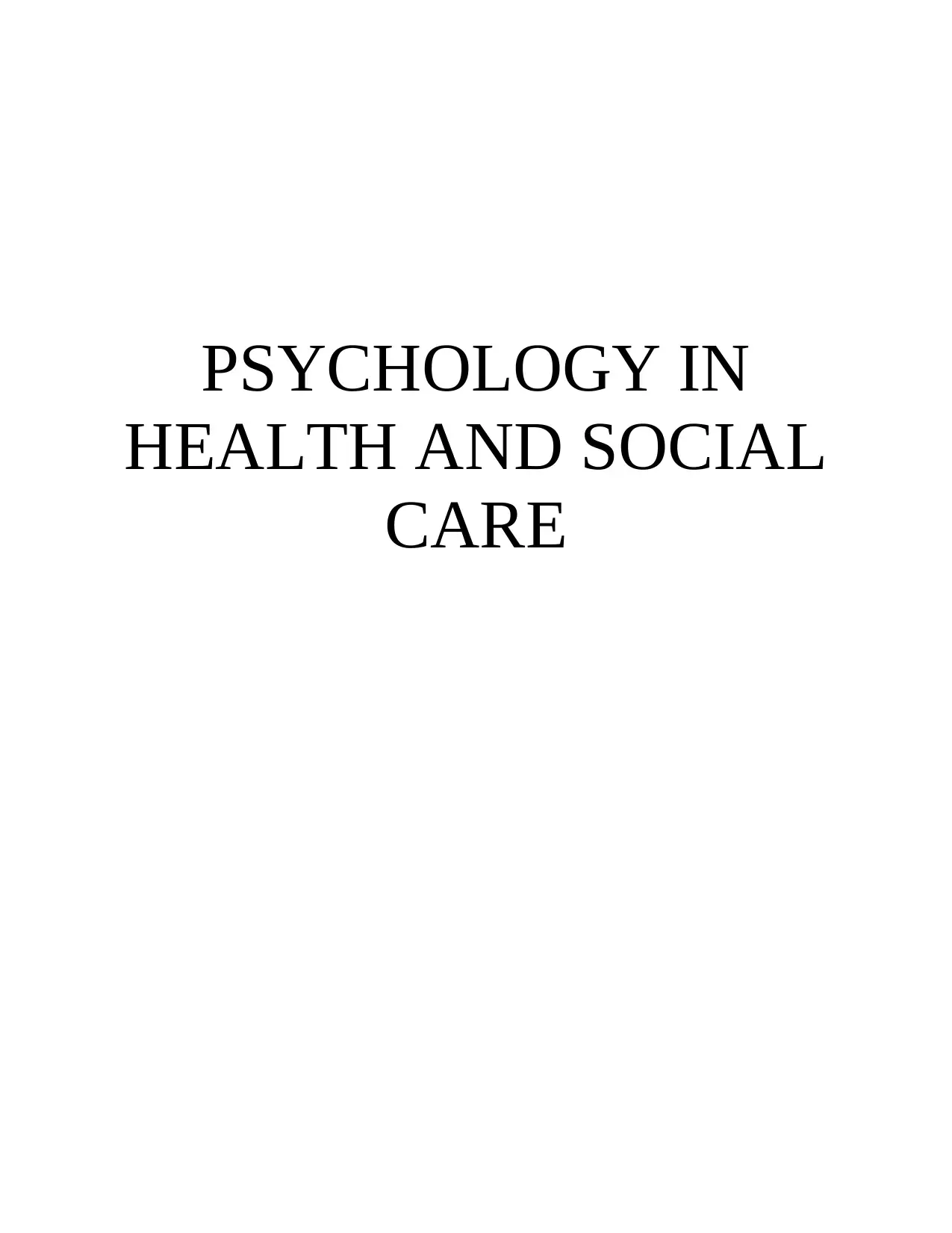
PSYCHOLOGY IN
HEALTH AND SOCIAL
CARE
HEALTH AND SOCIAL
CARE
Paraphrase This Document
Need a fresh take? Get an instant paraphrase of this document with our AI Paraphraser
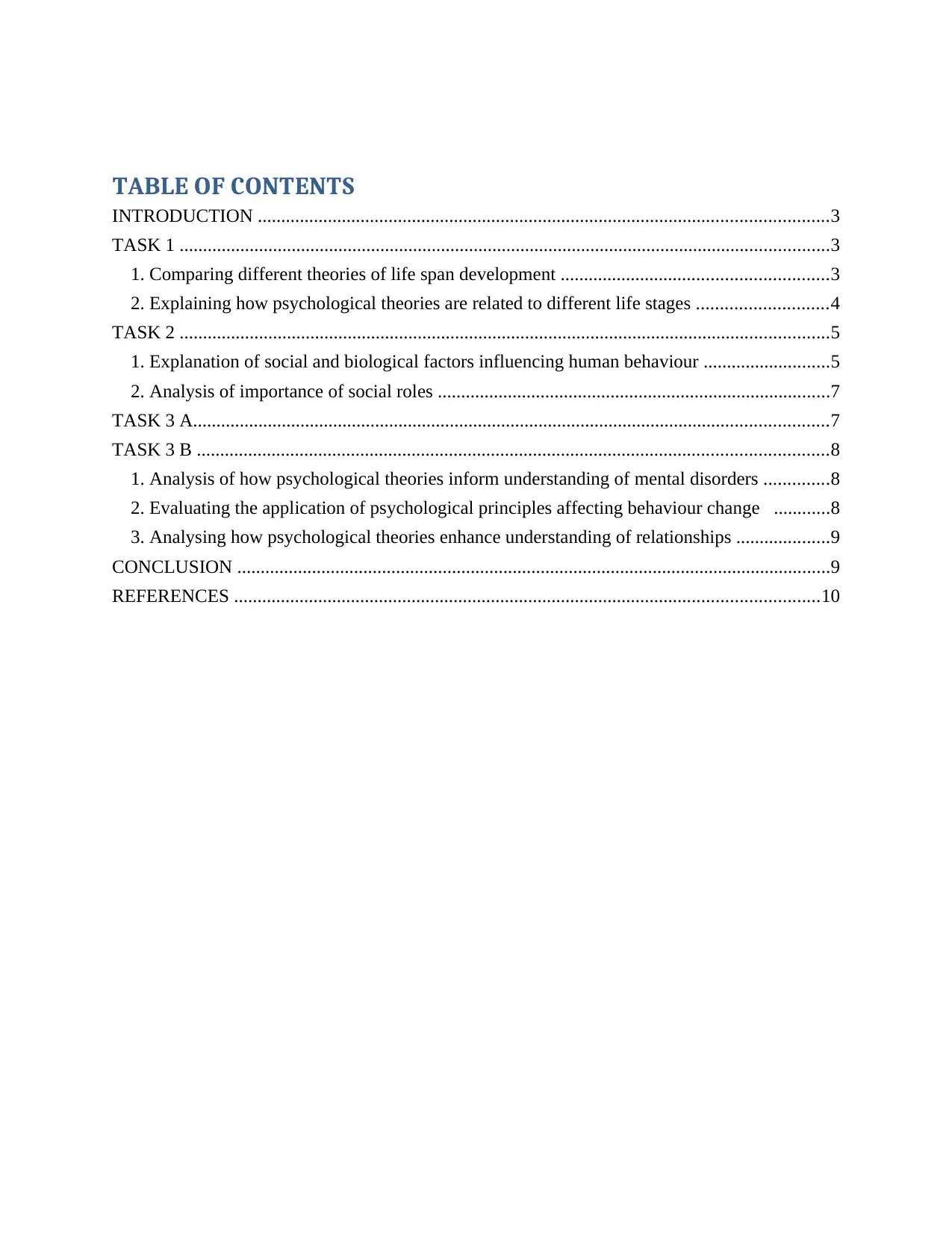
TABLE OF CONTENTS
INTRODUCTION ..........................................................................................................................3
TASK 1 ...........................................................................................................................................3
1. Comparing different theories of life span development .........................................................3
2. Explaining how psychological theories are related to different life stages ............................4
TASK 2 ...........................................................................................................................................5
1. Explanation of social and biological factors influencing human behaviour ...........................5
2. Analysis of importance of social roles ....................................................................................7
TASK 3 A........................................................................................................................................7
TASK 3 B .......................................................................................................................................8
1. Analysis of how psychological theories inform understanding of mental disorders ..............8
2. Evaluating the application of psychological principles affecting behaviour change ............8
3. Analysing how psychological theories enhance understanding of relationships ....................9
CONCLUSION ...............................................................................................................................9
REFERENCES .............................................................................................................................10
INTRODUCTION ..........................................................................................................................3
TASK 1 ...........................................................................................................................................3
1. Comparing different theories of life span development .........................................................3
2. Explaining how psychological theories are related to different life stages ............................4
TASK 2 ...........................................................................................................................................5
1. Explanation of social and biological factors influencing human behaviour ...........................5
2. Analysis of importance of social roles ....................................................................................7
TASK 3 A........................................................................................................................................7
TASK 3 B .......................................................................................................................................8
1. Analysis of how psychological theories inform understanding of mental disorders ..............8
2. Evaluating the application of psychological principles affecting behaviour change ............8
3. Analysing how psychological theories enhance understanding of relationships ....................9
CONCLUSION ...............................................................................................................................9
REFERENCES .............................................................................................................................10
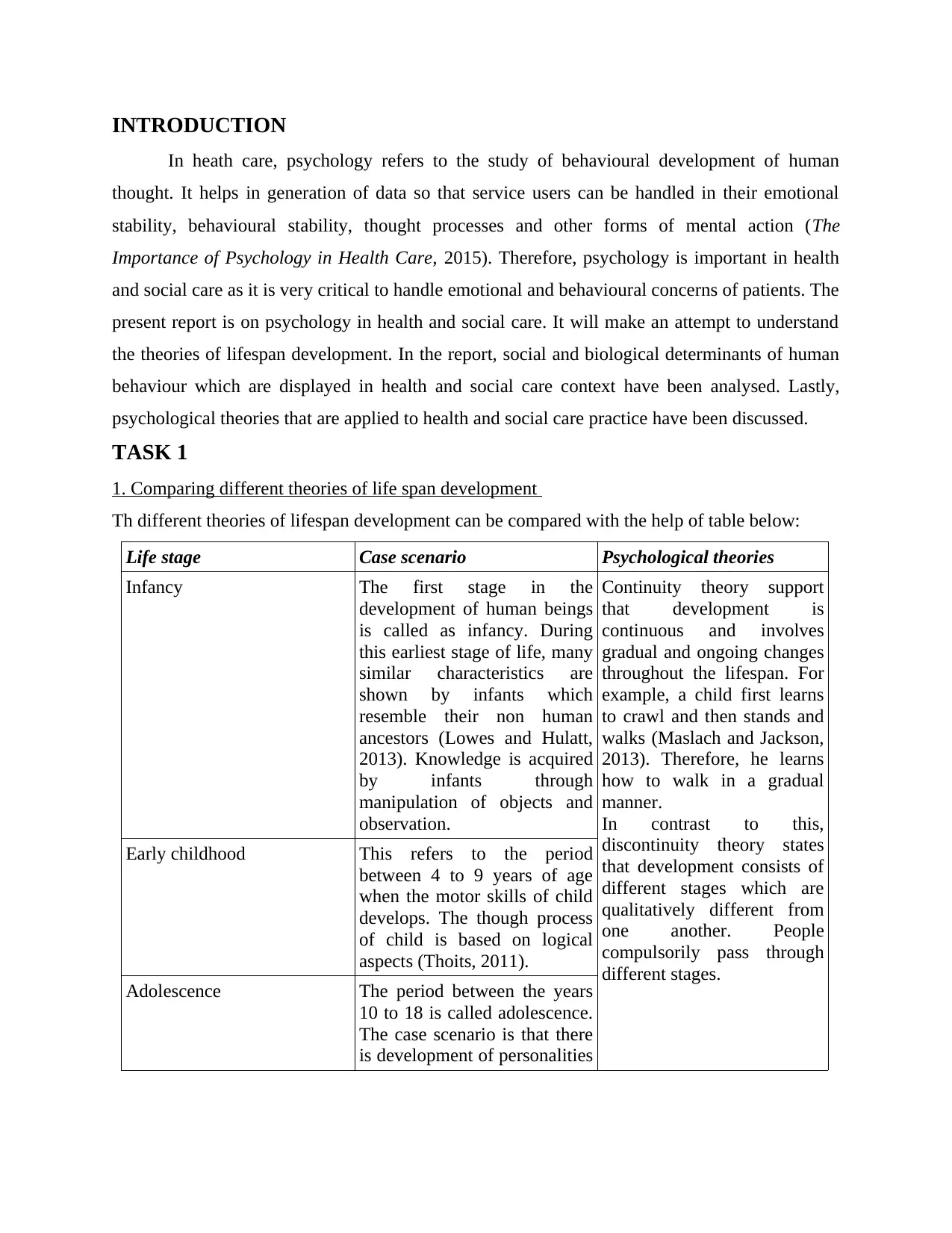
INTRODUCTION
In heath care, psychology refers to the study of behavioural development of human
thought. It helps in generation of data so that service users can be handled in their emotional
stability, behavioural stability, thought processes and other forms of mental action (The
Importance of Psychology in Health Care, 2015). Therefore, psychology is important in health
and social care as it is very critical to handle emotional and behavioural concerns of patients. The
present report is on psychology in health and social care. It will make an attempt to understand
the theories of lifespan development. In the report, social and biological determinants of human
behaviour which are displayed in health and social care context have been analysed. Lastly,
psychological theories that are applied to health and social care practice have been discussed.
TASK 1
1. Comparing different theories of life span development
Th different theories of lifespan development can be compared with the help of table below:
Life stage Case scenario Psychological theories
Infancy The first stage in the
development of human beings
is called as infancy. During
this earliest stage of life, many
similar characteristics are
shown by infants which
resemble their non human
ancestors (Lowes and Hulatt,
2013). Knowledge is acquired
by infants through
manipulation of objects and
observation.
Continuity theory support
that development is
continuous and involves
gradual and ongoing changes
throughout the lifespan. For
example, a child first learns
to crawl and then stands and
walks (Maslach and Jackson,
2013). Therefore, he learns
how to walk in a gradual
manner.
In contrast to this,
discontinuity theory states
that development consists of
different stages which are
qualitatively different from
one another. People
compulsorily pass through
different stages.
Early childhood This refers to the period
between 4 to 9 years of age
when the motor skills of child
develops. The though process
of child is based on logical
aspects (Thoits, 2011).
Adolescence The period between the years
10 to 18 is called adolescence.
The case scenario is that there
is development of personalities
In heath care, psychology refers to the study of behavioural development of human
thought. It helps in generation of data so that service users can be handled in their emotional
stability, behavioural stability, thought processes and other forms of mental action (The
Importance of Psychology in Health Care, 2015). Therefore, psychology is important in health
and social care as it is very critical to handle emotional and behavioural concerns of patients. The
present report is on psychology in health and social care. It will make an attempt to understand
the theories of lifespan development. In the report, social and biological determinants of human
behaviour which are displayed in health and social care context have been analysed. Lastly,
psychological theories that are applied to health and social care practice have been discussed.
TASK 1
1. Comparing different theories of life span development
Th different theories of lifespan development can be compared with the help of table below:
Life stage Case scenario Psychological theories
Infancy The first stage in the
development of human beings
is called as infancy. During
this earliest stage of life, many
similar characteristics are
shown by infants which
resemble their non human
ancestors (Lowes and Hulatt,
2013). Knowledge is acquired
by infants through
manipulation of objects and
observation.
Continuity theory support
that development is
continuous and involves
gradual and ongoing changes
throughout the lifespan. For
example, a child first learns
to crawl and then stands and
walks (Maslach and Jackson,
2013). Therefore, he learns
how to walk in a gradual
manner.
In contrast to this,
discontinuity theory states
that development consists of
different stages which are
qualitatively different from
one another. People
compulsorily pass through
different stages.
Early childhood This refers to the period
between 4 to 9 years of age
when the motor skills of child
develops. The though process
of child is based on logical
aspects (Thoits, 2011).
Adolescence The period between the years
10 to 18 is called adolescence.
The case scenario is that there
is development of personalities
⊘ This is a preview!⊘
Do you want full access?
Subscribe today to unlock all pages.

Trusted by 1+ million students worldwide
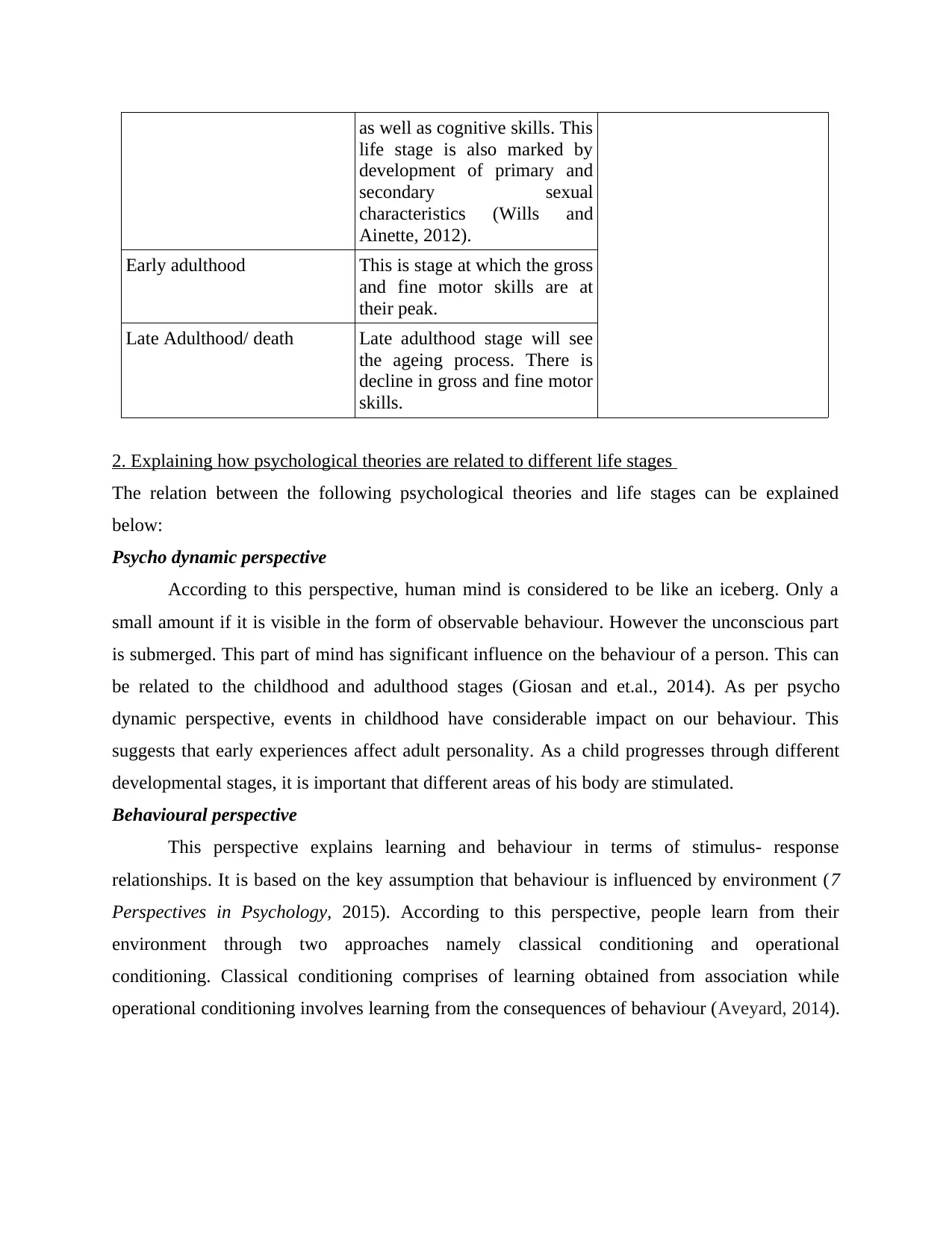
as well as cognitive skills. This
life stage is also marked by
development of primary and
secondary sexual
characteristics (Wills and
Ainette, 2012).
Early adulthood This is stage at which the gross
and fine motor skills are at
their peak.
Late Adulthood/ death Late adulthood stage will see
the ageing process. There is
decline in gross and fine motor
skills.
2. Explaining how psychological theories are related to different life stages
The relation between the following psychological theories and life stages can be explained
below:
Psycho dynamic perspective
According to this perspective, human mind is considered to be like an iceberg. Only a
small amount if it is visible in the form of observable behaviour. However the unconscious part
is submerged. This part of mind has significant influence on the behaviour of a person. This can
be related to the childhood and adulthood stages (Giosan and et.al., 2014). As per psycho
dynamic perspective, events in childhood have considerable impact on our behaviour. This
suggests that early experiences affect adult personality. As a child progresses through different
developmental stages, it is important that different areas of his body are stimulated.
Behavioural perspective
This perspective explains learning and behaviour in terms of stimulus- response
relationships. It is based on the key assumption that behaviour is influenced by environment (7
Perspectives in Psychology, 2015). According to this perspective, people learn from their
environment through two approaches namely classical conditioning and operational
conditioning. Classical conditioning comprises of learning obtained from association while
operational conditioning involves learning from the consequences of behaviour (Aveyard, 2014).
life stage is also marked by
development of primary and
secondary sexual
characteristics (Wills and
Ainette, 2012).
Early adulthood This is stage at which the gross
and fine motor skills are at
their peak.
Late Adulthood/ death Late adulthood stage will see
the ageing process. There is
decline in gross and fine motor
skills.
2. Explaining how psychological theories are related to different life stages
The relation between the following psychological theories and life stages can be explained
below:
Psycho dynamic perspective
According to this perspective, human mind is considered to be like an iceberg. Only a
small amount if it is visible in the form of observable behaviour. However the unconscious part
is submerged. This part of mind has significant influence on the behaviour of a person. This can
be related to the childhood and adulthood stages (Giosan and et.al., 2014). As per psycho
dynamic perspective, events in childhood have considerable impact on our behaviour. This
suggests that early experiences affect adult personality. As a child progresses through different
developmental stages, it is important that different areas of his body are stimulated.
Behavioural perspective
This perspective explains learning and behaviour in terms of stimulus- response
relationships. It is based on the key assumption that behaviour is influenced by environment (7
Perspectives in Psychology, 2015). According to this perspective, people learn from their
environment through two approaches namely classical conditioning and operational
conditioning. Classical conditioning comprises of learning obtained from association while
operational conditioning involves learning from the consequences of behaviour (Aveyard, 2014).
Paraphrase This Document
Need a fresh take? Get an instant paraphrase of this document with our AI Paraphraser
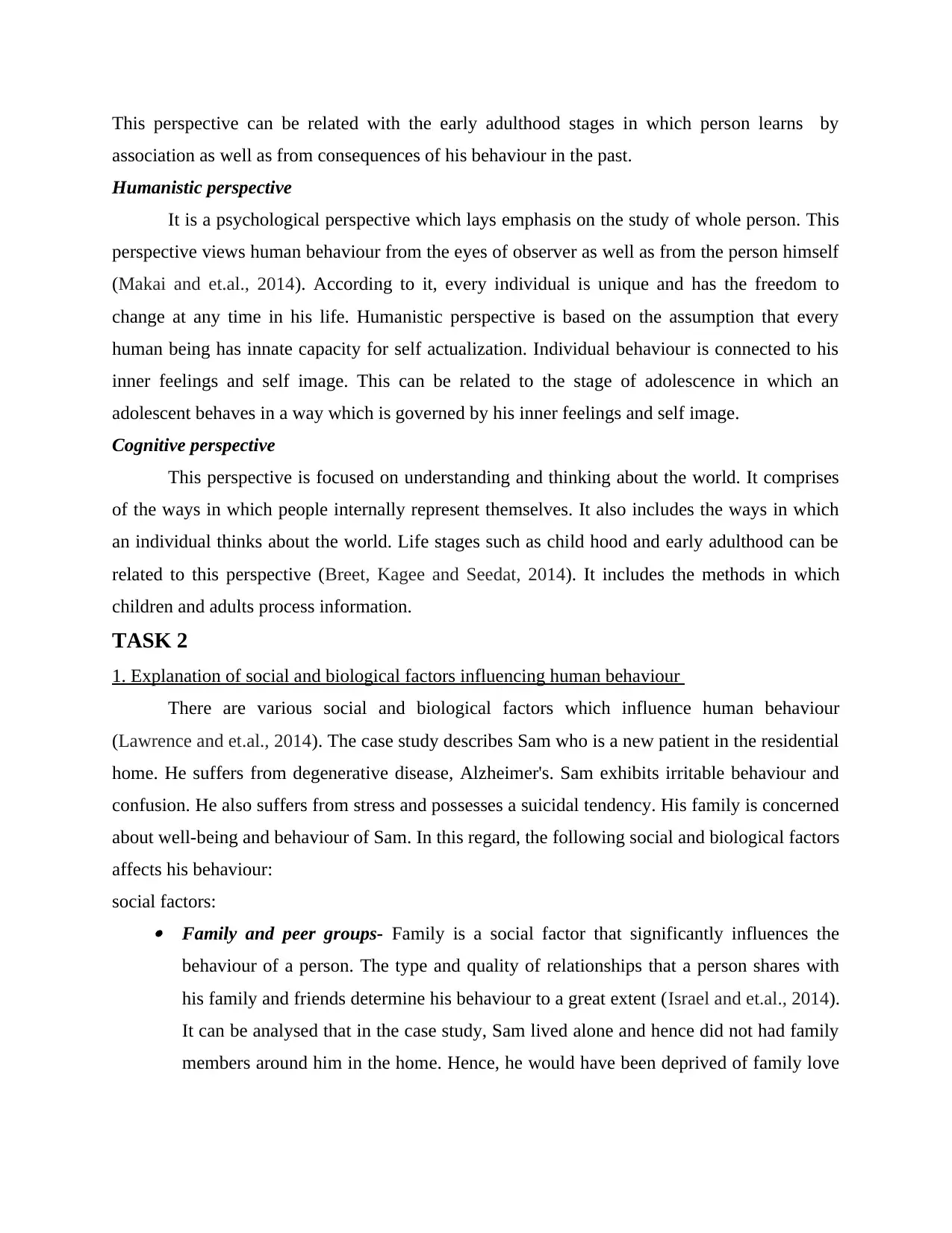
This perspective can be related with the early adulthood stages in which person learns by
association as well as from consequences of his behaviour in the past.
Humanistic perspective
It is a psychological perspective which lays emphasis on the study of whole person. This
perspective views human behaviour from the eyes of observer as well as from the person himself
(Makai and et.al., 2014). According to it, every individual is unique and has the freedom to
change at any time in his life. Humanistic perspective is based on the assumption that every
human being has innate capacity for self actualization. Individual behaviour is connected to his
inner feelings and self image. This can be related to the stage of adolescence in which an
adolescent behaves in a way which is governed by his inner feelings and self image.
Cognitive perspective
This perspective is focused on understanding and thinking about the world. It comprises
of the ways in which people internally represent themselves. It also includes the ways in which
an individual thinks about the world. Life stages such as child hood and early adulthood can be
related to this perspective (Breet, Kagee and Seedat, 2014). It includes the methods in which
children and adults process information.
TASK 2
1. Explanation of social and biological factors influencing human behaviour
There are various social and biological factors which influence human behaviour
(Lawrence and et.al., 2014). The case study describes Sam who is a new patient in the residential
home. He suffers from degenerative disease, Alzheimer's. Sam exhibits irritable behaviour and
confusion. He also suffers from stress and possesses a suicidal tendency. His family is concerned
about well-being and behaviour of Sam. In this regard, the following social and biological factors
affects his behaviour:
social factors: Family and peer groups- Family is a social factor that significantly influences the
behaviour of a person. The type and quality of relationships that a person shares with
his family and friends determine his behaviour to a great extent (Israel and et.al., 2014).
It can be analysed that in the case study, Sam lived alone and hence did not had family
members around him in the home. Hence, he would have been deprived of family love
association as well as from consequences of his behaviour in the past.
Humanistic perspective
It is a psychological perspective which lays emphasis on the study of whole person. This
perspective views human behaviour from the eyes of observer as well as from the person himself
(Makai and et.al., 2014). According to it, every individual is unique and has the freedom to
change at any time in his life. Humanistic perspective is based on the assumption that every
human being has innate capacity for self actualization. Individual behaviour is connected to his
inner feelings and self image. This can be related to the stage of adolescence in which an
adolescent behaves in a way which is governed by his inner feelings and self image.
Cognitive perspective
This perspective is focused on understanding and thinking about the world. It comprises
of the ways in which people internally represent themselves. It also includes the ways in which
an individual thinks about the world. Life stages such as child hood and early adulthood can be
related to this perspective (Breet, Kagee and Seedat, 2014). It includes the methods in which
children and adults process information.
TASK 2
1. Explanation of social and biological factors influencing human behaviour
There are various social and biological factors which influence human behaviour
(Lawrence and et.al., 2014). The case study describes Sam who is a new patient in the residential
home. He suffers from degenerative disease, Alzheimer's. Sam exhibits irritable behaviour and
confusion. He also suffers from stress and possesses a suicidal tendency. His family is concerned
about well-being and behaviour of Sam. In this regard, the following social and biological factors
affects his behaviour:
social factors: Family and peer groups- Family is a social factor that significantly influences the
behaviour of a person. The type and quality of relationships that a person shares with
his family and friends determine his behaviour to a great extent (Israel and et.al., 2014).
It can be analysed that in the case study, Sam lived alone and hence did not had family
members around him in the home. Hence, he would have been deprived of family love
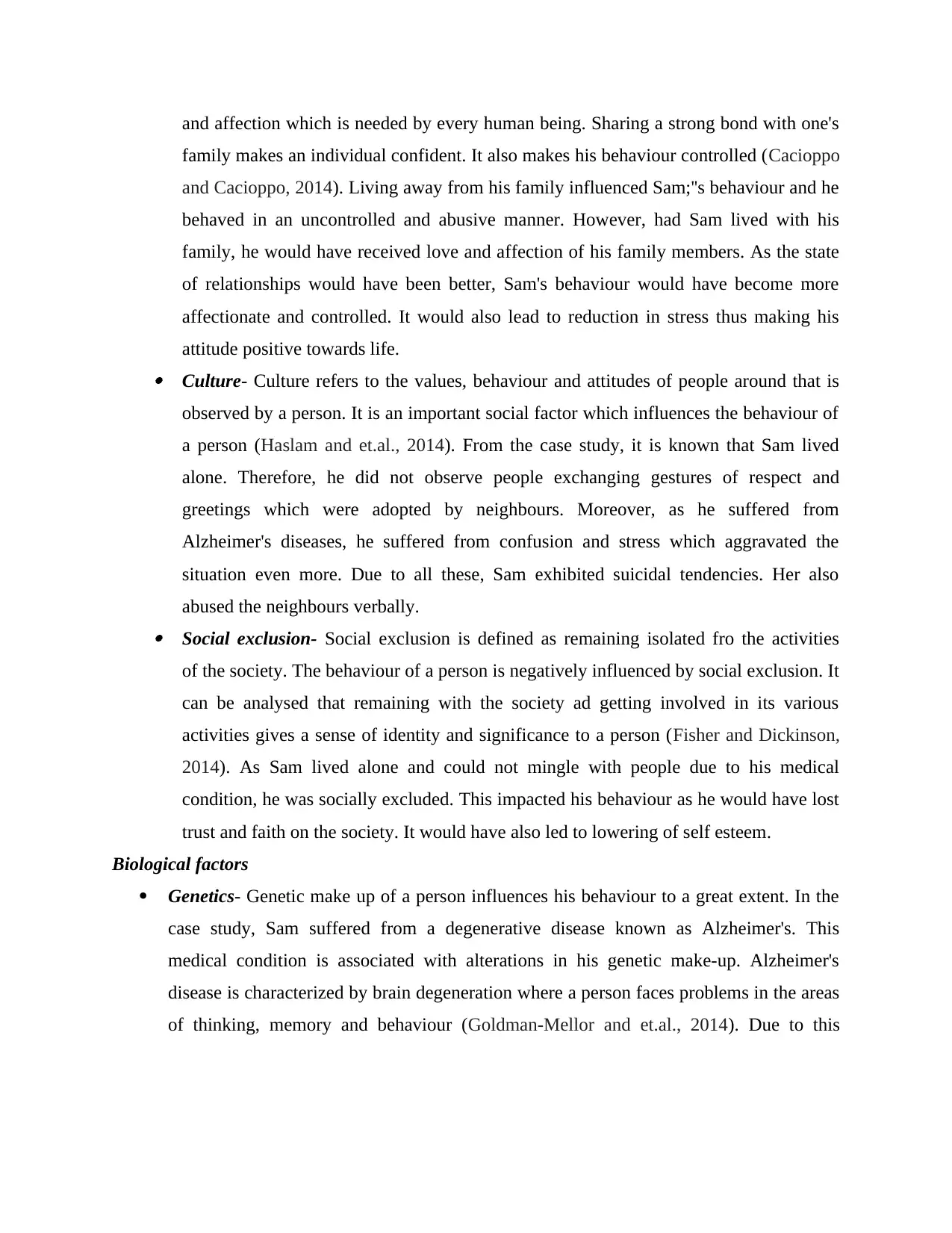
and affection which is needed by every human being. Sharing a strong bond with one's
family makes an individual confident. It also makes his behaviour controlled (Cacioppo
and Cacioppo, 2014). Living away from his family influenced Sam;''s behaviour and he
behaved in an uncontrolled and abusive manner. However, had Sam lived with his
family, he would have received love and affection of his family members. As the state
of relationships would have been better, Sam's behaviour would have become more
affectionate and controlled. It would also lead to reduction in stress thus making his
attitude positive towards life. Culture- Culture refers to the values, behaviour and attitudes of people around that is
observed by a person. It is an important social factor which influences the behaviour of
a person (Haslam and et.al., 2014). From the case study, it is known that Sam lived
alone. Therefore, he did not observe people exchanging gestures of respect and
greetings which were adopted by neighbours. Moreover, as he suffered from
Alzheimer's diseases, he suffered from confusion and stress which aggravated the
situation even more. Due to all these, Sam exhibited suicidal tendencies. Her also
abused the neighbours verbally. Social exclusion- Social exclusion is defined as remaining isolated fro the activities
of the society. The behaviour of a person is negatively influenced by social exclusion. It
can be analysed that remaining with the society ad getting involved in its various
activities gives a sense of identity and significance to a person (Fisher and Dickinson,
2014). As Sam lived alone and could not mingle with people due to his medical
condition, he was socially excluded. This impacted his behaviour as he would have lost
trust and faith on the society. It would have also led to lowering of self esteem.
Biological factors
Genetics- Genetic make up of a person influences his behaviour to a great extent. In the
case study, Sam suffered from a degenerative disease known as Alzheimer's. This
medical condition is associated with alterations in his genetic make-up. Alzheimer's
disease is characterized by brain degeneration where a person faces problems in the areas
of thinking, memory and behaviour (Goldman-Mellor and et.al., 2014). Due to this
family makes an individual confident. It also makes his behaviour controlled (Cacioppo
and Cacioppo, 2014). Living away from his family influenced Sam;''s behaviour and he
behaved in an uncontrolled and abusive manner. However, had Sam lived with his
family, he would have received love and affection of his family members. As the state
of relationships would have been better, Sam's behaviour would have become more
affectionate and controlled. It would also lead to reduction in stress thus making his
attitude positive towards life. Culture- Culture refers to the values, behaviour and attitudes of people around that is
observed by a person. It is an important social factor which influences the behaviour of
a person (Haslam and et.al., 2014). From the case study, it is known that Sam lived
alone. Therefore, he did not observe people exchanging gestures of respect and
greetings which were adopted by neighbours. Moreover, as he suffered from
Alzheimer's diseases, he suffered from confusion and stress which aggravated the
situation even more. Due to all these, Sam exhibited suicidal tendencies. Her also
abused the neighbours verbally. Social exclusion- Social exclusion is defined as remaining isolated fro the activities
of the society. The behaviour of a person is negatively influenced by social exclusion. It
can be analysed that remaining with the society ad getting involved in its various
activities gives a sense of identity and significance to a person (Fisher and Dickinson,
2014). As Sam lived alone and could not mingle with people due to his medical
condition, he was socially excluded. This impacted his behaviour as he would have lost
trust and faith on the society. It would have also led to lowering of self esteem.
Biological factors
Genetics- Genetic make up of a person influences his behaviour to a great extent. In the
case study, Sam suffered from a degenerative disease known as Alzheimer's. This
medical condition is associated with alterations in his genetic make-up. Alzheimer's
disease is characterized by brain degeneration where a person faces problems in the areas
of thinking, memory and behaviour (Goldman-Mellor and et.al., 2014). Due to this
⊘ This is a preview!⊘
Do you want full access?
Subscribe today to unlock all pages.

Trusted by 1+ million students worldwide
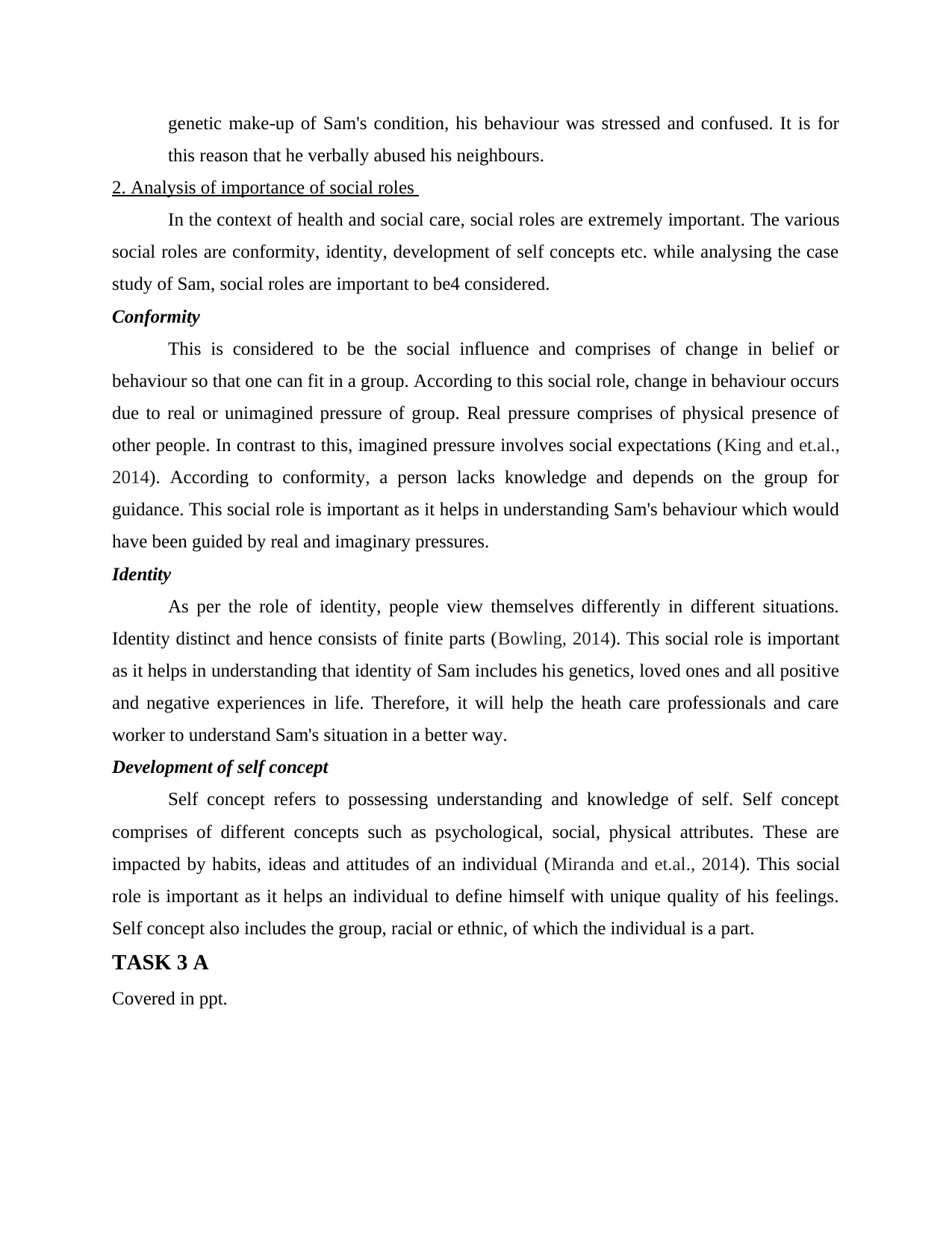
genetic make-up of Sam's condition, his behaviour was stressed and confused. It is for
this reason that he verbally abused his neighbours.
2. Analysis of importance of social roles
In the context of health and social care, social roles are extremely important. The various
social roles are conformity, identity, development of self concepts etc. while analysing the case
study of Sam, social roles are important to be4 considered.
Conformity
This is considered to be the social influence and comprises of change in belief or
behaviour so that one can fit in a group. According to this social role, change in behaviour occurs
due to real or unimagined pressure of group. Real pressure comprises of physical presence of
other people. In contrast to this, imagined pressure involves social expectations (King and et.al.,
2014). According to conformity, a person lacks knowledge and depends on the group for
guidance. This social role is important as it helps in understanding Sam's behaviour which would
have been guided by real and imaginary pressures.
Identity
As per the role of identity, people view themselves differently in different situations.
Identity distinct and hence consists of finite parts (Bowling, 2014). This social role is important
as it helps in understanding that identity of Sam includes his genetics, loved ones and all positive
and negative experiences in life. Therefore, it will help the heath care professionals and care
worker to understand Sam's situation in a better way.
Development of self concept
Self concept refers to possessing understanding and knowledge of self. Self concept
comprises of different concepts such as psychological, social, physical attributes. These are
impacted by habits, ideas and attitudes of an individual (Miranda and et.al., 2014). This social
role is important as it helps an individual to define himself with unique quality of his feelings.
Self concept also includes the group, racial or ethnic, of which the individual is a part.
TASK 3 A
Covered in ppt.
this reason that he verbally abused his neighbours.
2. Analysis of importance of social roles
In the context of health and social care, social roles are extremely important. The various
social roles are conformity, identity, development of self concepts etc. while analysing the case
study of Sam, social roles are important to be4 considered.
Conformity
This is considered to be the social influence and comprises of change in belief or
behaviour so that one can fit in a group. According to this social role, change in behaviour occurs
due to real or unimagined pressure of group. Real pressure comprises of physical presence of
other people. In contrast to this, imagined pressure involves social expectations (King and et.al.,
2014). According to conformity, a person lacks knowledge and depends on the group for
guidance. This social role is important as it helps in understanding Sam's behaviour which would
have been guided by real and imaginary pressures.
Identity
As per the role of identity, people view themselves differently in different situations.
Identity distinct and hence consists of finite parts (Bowling, 2014). This social role is important
as it helps in understanding that identity of Sam includes his genetics, loved ones and all positive
and negative experiences in life. Therefore, it will help the heath care professionals and care
worker to understand Sam's situation in a better way.
Development of self concept
Self concept refers to possessing understanding and knowledge of self. Self concept
comprises of different concepts such as psychological, social, physical attributes. These are
impacted by habits, ideas and attitudes of an individual (Miranda and et.al., 2014). This social
role is important as it helps an individual to define himself with unique quality of his feelings.
Self concept also includes the group, racial or ethnic, of which the individual is a part.
TASK 3 A
Covered in ppt.
Paraphrase This Document
Need a fresh take? Get an instant paraphrase of this document with our AI Paraphraser
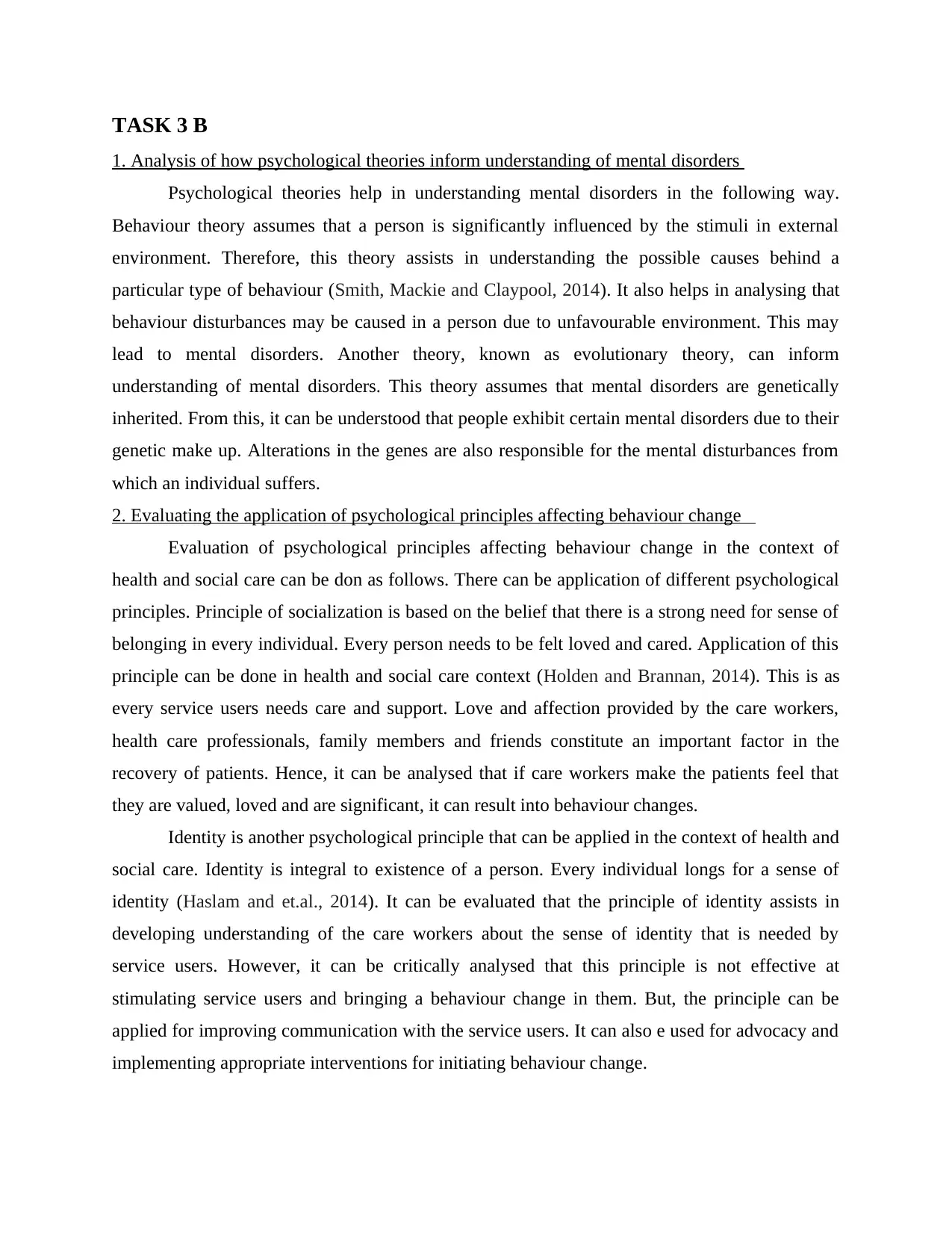
TASK 3 B
1. Analysis of how psychological theories inform understanding of mental disorders
Psychological theories help in understanding mental disorders in the following way.
Behaviour theory assumes that a person is significantly influenced by the stimuli in external
environment. Therefore, this theory assists in understanding the possible causes behind a
particular type of behaviour (Smith, Mackie and Claypool, 2014). It also helps in analysing that
behaviour disturbances may be caused in a person due to unfavourable environment. This may
lead to mental disorders. Another theory, known as evolutionary theory, can inform
understanding of mental disorders. This theory assumes that mental disorders are genetically
inherited. From this, it can be understood that people exhibit certain mental disorders due to their
genetic make up. Alterations in the genes are also responsible for the mental disturbances from
which an individual suffers.
2. Evaluating the application of psychological principles affecting behaviour change
Evaluation of psychological principles affecting behaviour change in the context of
health and social care can be don as follows. There can be application of different psychological
principles. Principle of socialization is based on the belief that there is a strong need for sense of
belonging in every individual. Every person needs to be felt loved and cared. Application of this
principle can be done in health and social care context (Holden and Brannan, 2014). This is as
every service users needs care and support. Love and affection provided by the care workers,
health care professionals, family members and friends constitute an important factor in the
recovery of patients. Hence, it can be analysed that if care workers make the patients feel that
they are valued, loved and are significant, it can result into behaviour changes.
Identity is another psychological principle that can be applied in the context of health and
social care. Identity is integral to existence of a person. Every individual longs for a sense of
identity (Haslam and et.al., 2014). It can be evaluated that the principle of identity assists in
developing understanding of the care workers about the sense of identity that is needed by
service users. However, it can be critically analysed that this principle is not effective at
stimulating service users and bringing a behaviour change in them. But, the principle can be
applied for improving communication with the service users. It can also e used for advocacy and
implementing appropriate interventions for initiating behaviour change.
1. Analysis of how psychological theories inform understanding of mental disorders
Psychological theories help in understanding mental disorders in the following way.
Behaviour theory assumes that a person is significantly influenced by the stimuli in external
environment. Therefore, this theory assists in understanding the possible causes behind a
particular type of behaviour (Smith, Mackie and Claypool, 2014). It also helps in analysing that
behaviour disturbances may be caused in a person due to unfavourable environment. This may
lead to mental disorders. Another theory, known as evolutionary theory, can inform
understanding of mental disorders. This theory assumes that mental disorders are genetically
inherited. From this, it can be understood that people exhibit certain mental disorders due to their
genetic make up. Alterations in the genes are also responsible for the mental disturbances from
which an individual suffers.
2. Evaluating the application of psychological principles affecting behaviour change
Evaluation of psychological principles affecting behaviour change in the context of
health and social care can be don as follows. There can be application of different psychological
principles. Principle of socialization is based on the belief that there is a strong need for sense of
belonging in every individual. Every person needs to be felt loved and cared. Application of this
principle can be done in health and social care context (Holden and Brannan, 2014). This is as
every service users needs care and support. Love and affection provided by the care workers,
health care professionals, family members and friends constitute an important factor in the
recovery of patients. Hence, it can be analysed that if care workers make the patients feel that
they are valued, loved and are significant, it can result into behaviour changes.
Identity is another psychological principle that can be applied in the context of health and
social care. Identity is integral to existence of a person. Every individual longs for a sense of
identity (Haslam and et.al., 2014). It can be evaluated that the principle of identity assists in
developing understanding of the care workers about the sense of identity that is needed by
service users. However, it can be critically analysed that this principle is not effective at
stimulating service users and bringing a behaviour change in them. But, the principle can be
applied for improving communication with the service users. It can also e used for advocacy and
implementing appropriate interventions for initiating behaviour change.
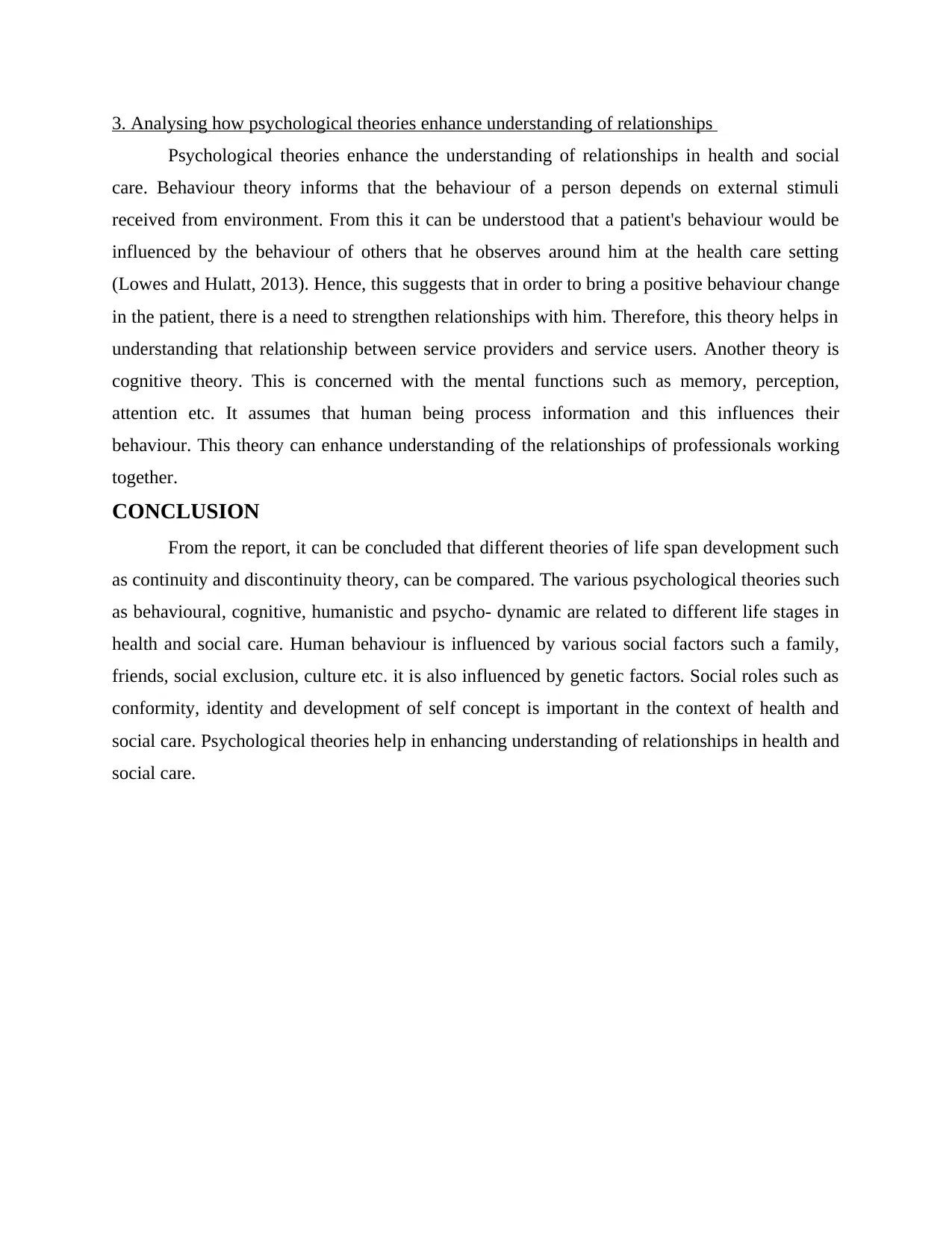
3. Analysing how psychological theories enhance understanding of relationships
Psychological theories enhance the understanding of relationships in health and social
care. Behaviour theory informs that the behaviour of a person depends on external stimuli
received from environment. From this it can be understood that a patient's behaviour would be
influenced by the behaviour of others that he observes around him at the health care setting
(Lowes and Hulatt, 2013). Hence, this suggests that in order to bring a positive behaviour change
in the patient, there is a need to strengthen relationships with him. Therefore, this theory helps in
understanding that relationship between service providers and service users. Another theory is
cognitive theory. This is concerned with the mental functions such as memory, perception,
attention etc. It assumes that human being process information and this influences their
behaviour. This theory can enhance understanding of the relationships of professionals working
together.
CONCLUSION
From the report, it can be concluded that different theories of life span development such
as continuity and discontinuity theory, can be compared. The various psychological theories such
as behavioural, cognitive, humanistic and psycho- dynamic are related to different life stages in
health and social care. Human behaviour is influenced by various social factors such a family,
friends, social exclusion, culture etc. it is also influenced by genetic factors. Social roles such as
conformity, identity and development of self concept is important in the context of health and
social care. Psychological theories help in enhancing understanding of relationships in health and
social care.
Psychological theories enhance the understanding of relationships in health and social
care. Behaviour theory informs that the behaviour of a person depends on external stimuli
received from environment. From this it can be understood that a patient's behaviour would be
influenced by the behaviour of others that he observes around him at the health care setting
(Lowes and Hulatt, 2013). Hence, this suggests that in order to bring a positive behaviour change
in the patient, there is a need to strengthen relationships with him. Therefore, this theory helps in
understanding that relationship between service providers and service users. Another theory is
cognitive theory. This is concerned with the mental functions such as memory, perception,
attention etc. It assumes that human being process information and this influences their
behaviour. This theory can enhance understanding of the relationships of professionals working
together.
CONCLUSION
From the report, it can be concluded that different theories of life span development such
as continuity and discontinuity theory, can be compared. The various psychological theories such
as behavioural, cognitive, humanistic and psycho- dynamic are related to different life stages in
health and social care. Human behaviour is influenced by various social factors such a family,
friends, social exclusion, culture etc. it is also influenced by genetic factors. Social roles such as
conformity, identity and development of self concept is important in the context of health and
social care. Psychological theories help in enhancing understanding of relationships in health and
social care.
⊘ This is a preview!⊘
Do you want full access?
Subscribe today to unlock all pages.

Trusted by 1+ million students worldwide
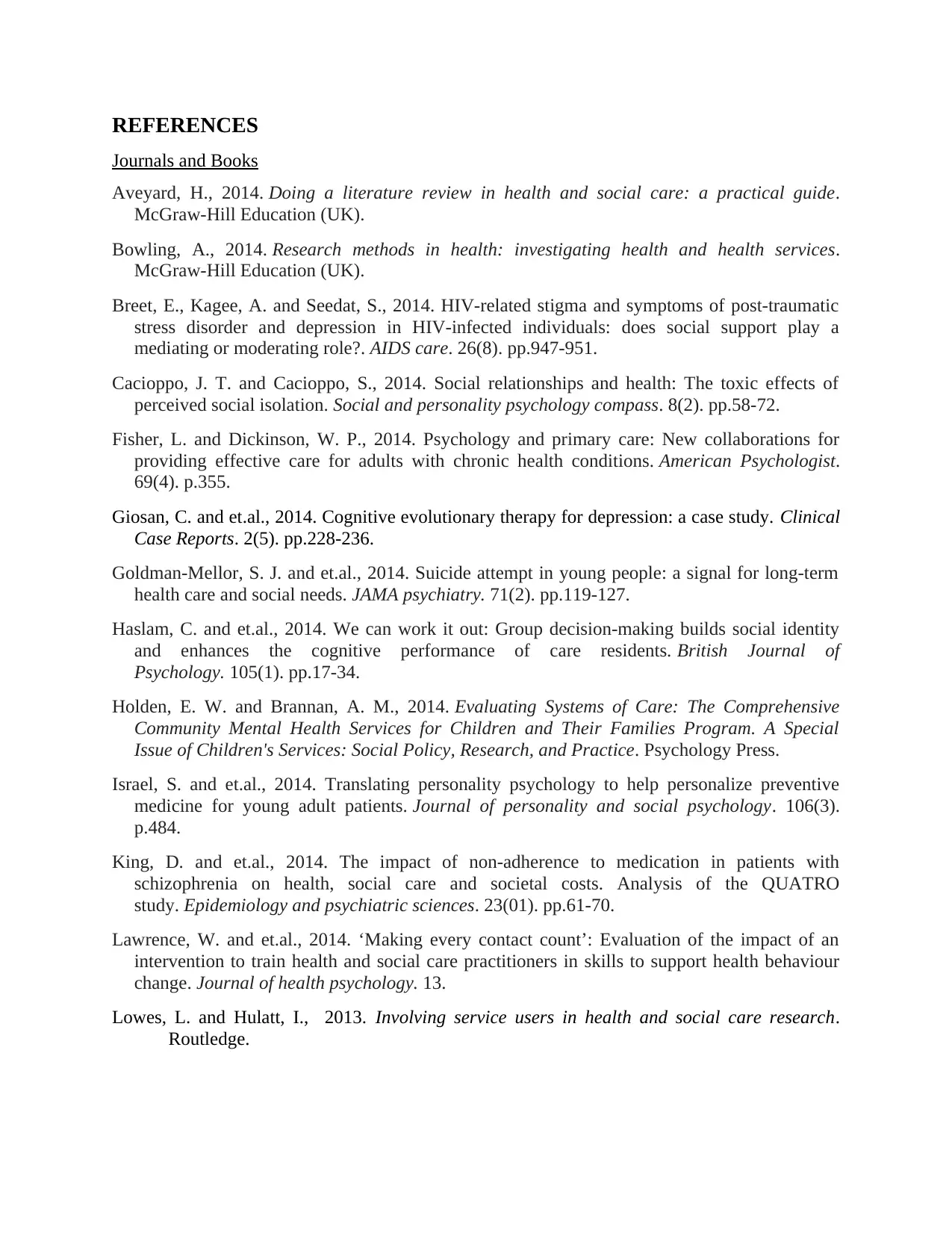
REFERENCES
Journals and Books
Aveyard, H., 2014. Doing a literature review in health and social care: a practical guide.
McGraw-Hill Education (UK).
Bowling, A., 2014. Research methods in health: investigating health and health services.
McGraw-Hill Education (UK).
Breet, E., Kagee, A. and Seedat, S., 2014. HIV-related stigma and symptoms of post-traumatic
stress disorder and depression in HIV-infected individuals: does social support play a
mediating or moderating role?. AIDS care. 26(8). pp.947-951.
Cacioppo, J. T. and Cacioppo, S., 2014. Social relationships and health: The toxic effects of
perceived social isolation. Social and personality psychology compass. 8(2). pp.58-72.
Fisher, L. and Dickinson, W. P., 2014. Psychology and primary care: New collaborations for
providing effective care for adults with chronic health conditions. American Psychologist.
69(4). p.355.
Giosan, C. and et.al., 2014. Cognitive evolutionary therapy for depression: a case study. Clinical
Case Reports. 2(5). pp.228-236.
Goldman-Mellor, S. J. and et.al., 2014. Suicide attempt in young people: a signal for long-term
health care and social needs. JAMA psychiatry. 71(2). pp.119-127.
Haslam, C. and et.al., 2014. We can work it out: Group decision‐making builds social identity
and enhances the cognitive performance of care residents. British Journal of
Psychology. 105(1). pp.17-34.
Holden, E. W. and Brannan, A. M., 2014. Evaluating Systems of Care: The Comprehensive
Community Mental Health Services for Children and Their Families Program. A Special
Issue of Children's Services: Social Policy, Research, and Practice. Psychology Press.
Israel, S. and et.al., 2014. Translating personality psychology to help personalize preventive
medicine for young adult patients. Journal of personality and social psychology. 106(3).
p.484.
King, D. and et.al., 2014. The impact of non-adherence to medication in patients with
schizophrenia on health, social care and societal costs. Analysis of the QUATRO
study. Epidemiology and psychiatric sciences. 23(01). pp.61-70.
Lawrence, W. and et.al., 2014. ‘Making every contact count’: Evaluation of the impact of an
intervention to train health and social care practitioners in skills to support health behaviour
change. Journal of health psychology. 13.
Lowes, L. and Hulatt, I., 2013. Involving service users in health and social care research.
Routledge.
Journals and Books
Aveyard, H., 2014. Doing a literature review in health and social care: a practical guide.
McGraw-Hill Education (UK).
Bowling, A., 2014. Research methods in health: investigating health and health services.
McGraw-Hill Education (UK).
Breet, E., Kagee, A. and Seedat, S., 2014. HIV-related stigma and symptoms of post-traumatic
stress disorder and depression in HIV-infected individuals: does social support play a
mediating or moderating role?. AIDS care. 26(8). pp.947-951.
Cacioppo, J. T. and Cacioppo, S., 2014. Social relationships and health: The toxic effects of
perceived social isolation. Social and personality psychology compass. 8(2). pp.58-72.
Fisher, L. and Dickinson, W. P., 2014. Psychology and primary care: New collaborations for
providing effective care for adults with chronic health conditions. American Psychologist.
69(4). p.355.
Giosan, C. and et.al., 2014. Cognitive evolutionary therapy for depression: a case study. Clinical
Case Reports. 2(5). pp.228-236.
Goldman-Mellor, S. J. and et.al., 2014. Suicide attempt in young people: a signal for long-term
health care and social needs. JAMA psychiatry. 71(2). pp.119-127.
Haslam, C. and et.al., 2014. We can work it out: Group decision‐making builds social identity
and enhances the cognitive performance of care residents. British Journal of
Psychology. 105(1). pp.17-34.
Holden, E. W. and Brannan, A. M., 2014. Evaluating Systems of Care: The Comprehensive
Community Mental Health Services for Children and Their Families Program. A Special
Issue of Children's Services: Social Policy, Research, and Practice. Psychology Press.
Israel, S. and et.al., 2014. Translating personality psychology to help personalize preventive
medicine for young adult patients. Journal of personality and social psychology. 106(3).
p.484.
King, D. and et.al., 2014. The impact of non-adherence to medication in patients with
schizophrenia on health, social care and societal costs. Analysis of the QUATRO
study. Epidemiology and psychiatric sciences. 23(01). pp.61-70.
Lawrence, W. and et.al., 2014. ‘Making every contact count’: Evaluation of the impact of an
intervention to train health and social care practitioners in skills to support health behaviour
change. Journal of health psychology. 13.
Lowes, L. and Hulatt, I., 2013. Involving service users in health and social care research.
Routledge.
Paraphrase This Document
Need a fresh take? Get an instant paraphrase of this document with our AI Paraphraser
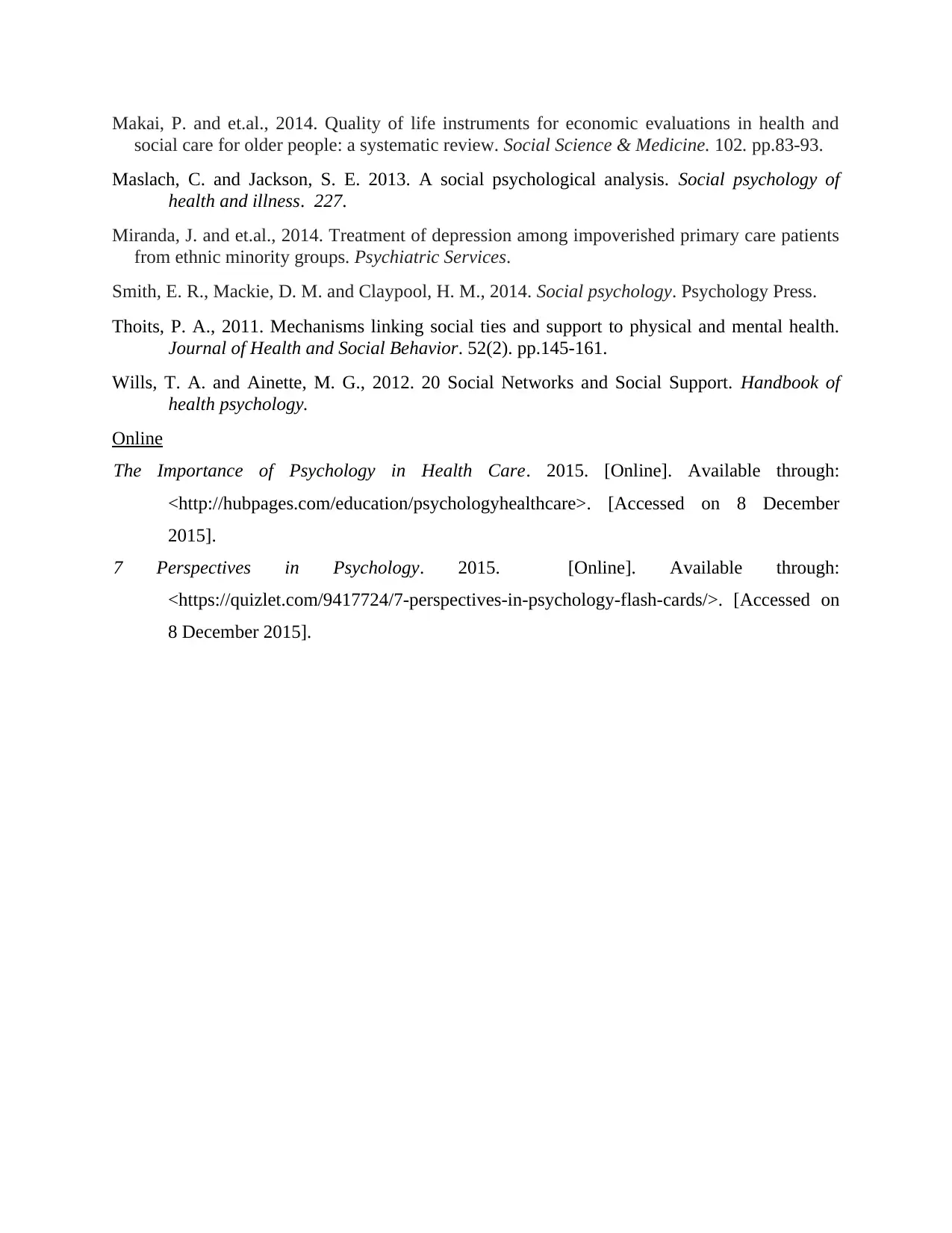
Makai, P. and et.al., 2014. Quality of life instruments for economic evaluations in health and
social care for older people: a systematic review. Social Science & Medicine. 102. pp.83-93.
Maslach, C. and Jackson, S. E. 2013. A social psychological analysis. Social psychology of
health and illness. 227.
Miranda, J. and et.al., 2014. Treatment of depression among impoverished primary care patients
from ethnic minority groups. Psychiatric Services.
Smith, E. R., Mackie, D. M. and Claypool, H. M., 2014. Social psychology. Psychology Press.
Thoits, P. A., 2011. Mechanisms linking social ties and support to physical and mental health.
Journal of Health and Social Behavior. 52(2). pp.145-161.
Wills, T. A. and Ainette, M. G., 2012. 20 Social Networks and Social Support. Handbook of
health psychology.
Online
The Importance of Psychology in Health Care. 2015. [Online]. Available through:
<http://hubpages.com/education/psychologyhealthcare>. [Accessed on 8 December
2015].
7 Perspectives in Psychology. 2015. [Online]. Available through:
<https://quizlet.com/9417724/7-perspectives-in-psychology-flash-cards/>. [Accessed on
8 December 2015].
social care for older people: a systematic review. Social Science & Medicine. 102. pp.83-93.
Maslach, C. and Jackson, S. E. 2013. A social psychological analysis. Social psychology of
health and illness. 227.
Miranda, J. and et.al., 2014. Treatment of depression among impoverished primary care patients
from ethnic minority groups. Psychiatric Services.
Smith, E. R., Mackie, D. M. and Claypool, H. M., 2014. Social psychology. Psychology Press.
Thoits, P. A., 2011. Mechanisms linking social ties and support to physical and mental health.
Journal of Health and Social Behavior. 52(2). pp.145-161.
Wills, T. A. and Ainette, M. G., 2012. 20 Social Networks and Social Support. Handbook of
health psychology.
Online
The Importance of Psychology in Health Care. 2015. [Online]. Available through:
<http://hubpages.com/education/psychologyhealthcare>. [Accessed on 8 December
2015].
7 Perspectives in Psychology. 2015. [Online]. Available through:
<https://quizlet.com/9417724/7-perspectives-in-psychology-flash-cards/>. [Accessed on
8 December 2015].
1 out of 11
Related Documents
Your All-in-One AI-Powered Toolkit for Academic Success.
+13062052269
info@desklib.com
Available 24*7 on WhatsApp / Email
![[object Object]](/_next/static/media/star-bottom.7253800d.svg)
Unlock your academic potential
Copyright © 2020–2026 A2Z Services. All Rights Reserved. Developed and managed by ZUCOL.





